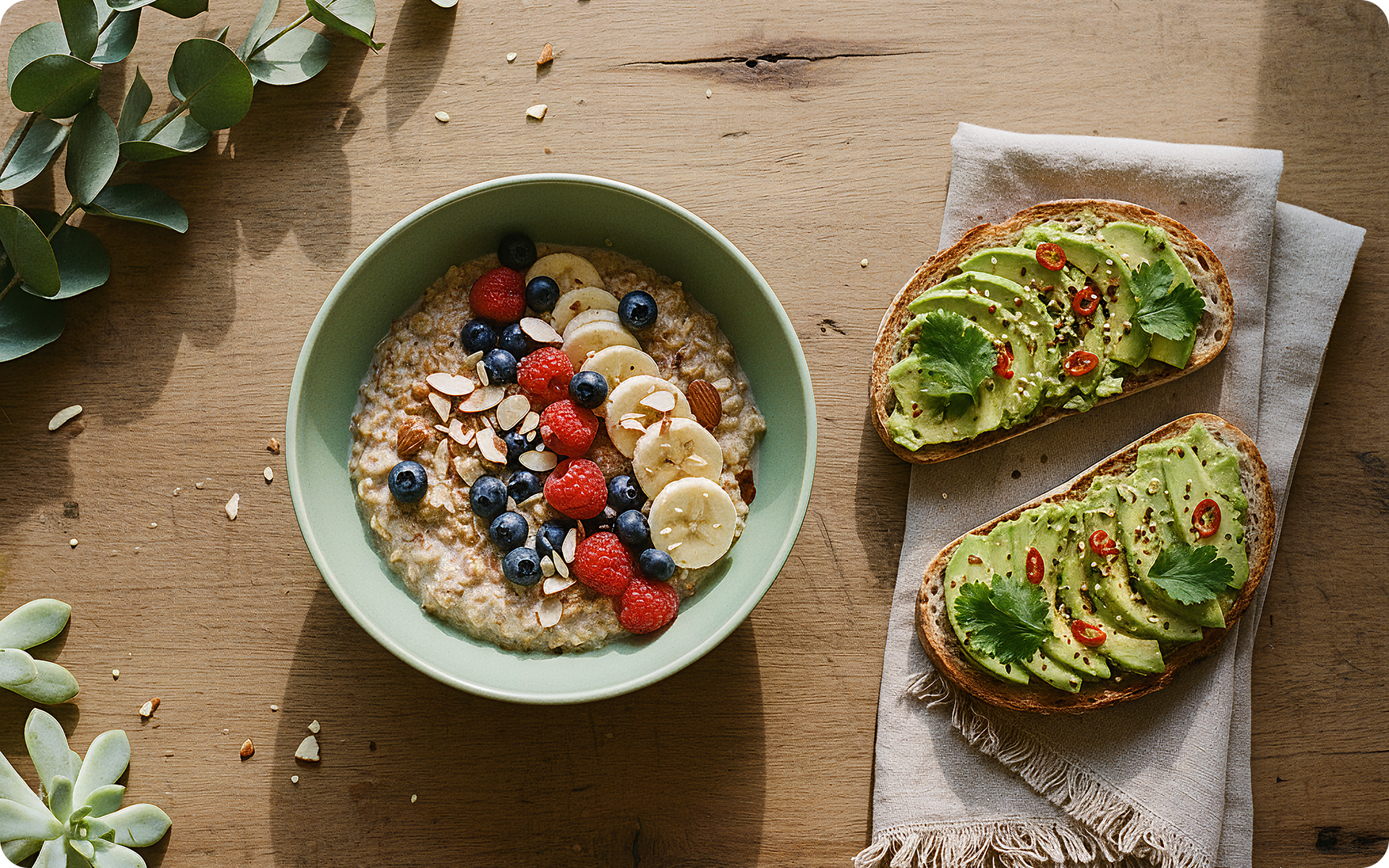In recent years, many people have started slowly to replace dairy milk with plant-based options due to claims that these alternatives are better for your health and the environment. Popular among these plant-based alternatives is soy milk. However, some recent reports have claimed that soy milk may increase your weight. So can soy milk make you gain weight?
What Is Soy Milk?
Soy milk, also known as soya milk, is a traditional high-protein beverage that is made from whole soybeans and is the raw material from which tofu, soy yogurt, and soy-based cheeses are made (1).
Originating from China, soy milk was largely consumed in this and other East and Southeast Asian countries and has now made its way to the West. Traditional soy milk is made by soaking the soybeans then grinding, heating, and then filtering them (1).
What Are Soy Milk Nutrition Facts?
The subject of soy milk benefits is one that you’ll hear a lot when looking to understand why this dairy alternative is so popular in both the East and the West. All these benefits can be traced back to how nutrient-rich this beverage is.
According to the United States Department of Agriculture (USDA), 1 cup of soy milk (244g) has the following nutrition values (2):
- Energy/calories – 129 cal
- Protein – 8.32 g
- Fats – 5 g
- Carbohydrates – 12.7 g.
When it comes to minerals and vitamins, soy milk is also quite impressive:
- Calcium – 237 mg
- Phosphorus – 161 mg
- Magnesium – 51.2 mg
- Sodium – 80.5 mg
- Selenium – 4.39 mg
- Folate – 46.4 µg
- Vitamin A – 137 µg
- Lutein and zeaxanthin – 19.5 µg
- Vitamin K – 7.08 µg
- Choline – 55.4 mg
Soy milk also has trace amounts of vitamins B-12, B-6, D, and E, in addition to other minerals such as copper, zinc, and iron.
If you choose to compare the above soy milk nutrition facts to those of whole cow milk, you’ll note that the latter is slightly lower in calories and sodium but higher in protein, potassium, iron, magnesium, copper, folate, choline, and vitamin A.
However, the former is higher in calcium, selenium, and phosphorus and slightly lower in carbs. Dairy also has lactose (12.3 g per cup – 244g), which isn’t in soy milk or any other plant-based milks (3).
What Are the Benefits of Drinking Soy Milk?
As outlined above, this dairy alternative is incredibly nutrient-rich. But how do these nutrients translate into health? Here are some of the benefits of soy milk:
- Protection Against Cardiovascular and Heart Disease
According to the World Health Organisation, cardiovascular disease has remained the biggest culprit of mortality for the last three decades, accounting for approximately one-third of all global deaths (4). Having a healthy diet is one of the first major steps that can help you lower the risk of heart and cardiovascular diseases (5).
Research has shown that the consumption of soy milk can help with this in the following ways:
1. Reduced Cholesterol Levels
In an older meta-analysis published in The New England Journal of Medicine, results from 38 controlled clinical trials showed that consuming approximately 50 grams of soy protein per day resulted in a 9.3% decrease in total cholesterol and a 13% decrease in LDL (bad) cholesterol without significantly affecting serum HDL (good) cholesterol concentrations (6).
In another study published in the Journal of the American College of Nutrition, researchers comparing the effects of soy milk vs dairy milk on patients with hypercholesterolemia (high cholesterol) found that the consumption of just 25 g a day of soy milk led to a 5% decrease of LDL cholesterol in these patients (7). Having too much LDL cholesterol in your body can raise your risk of heart disease and stroke.
2. Reduced Blood Pressure and the Presence of Mono and Poly-Unsaturated Fatty Acids
While reducing bad cholesterol levels in the body plays a significant part in reducing the risk of cardiovascular and heart disease in soy milk consumers, this isn’t the only benefit this beverage offers toward the protection of these illnesses.
In one systematic review and meta-analysis of randomized controlled trials published in 2021, researchers found that soy milk contains both mono and polyunsaturated fats, which have been linked to improved heart health (8).
They also found that this plant-based milk significantly reduced systolic and diastolic blood pressure, total and low-density lipoprotein cholesterol, and waist circumference (8) – all factors that have historically been linked to a greater risk of cardiovascular illness.
BetterMe: Health Coaching app helps you achieve your body goals with ease and efficiency by helping to choose proper meal plans and effective workouts. Start using our app and you will see good results in a short time.
- May Alleviate Symptoms of Menopause
When it comes to the benefits of soy milk for females, alleviating the symptoms of menopause may be the biggest benefit, especially for older women. Generally, hormone therapy (HRT) is what many women who are going through perimenopause and menopause are advised to look into in order to relieve their symptoms.
However, while HRT is effective for this, many people are concerned about the serious side effects that may come from this – namely an increased risk of breast cancer, blood clots, and even stroke (9).
If you’re struggling with menopause symptoms, specifically hot flashes, and don’t want to resort to HRT, drinking soy milk could be the thing to try.
In an older study published in the Obstetrics & Gynecology journal, researchers found that when postmenopausal women supplemented their diets with soy, the frequency of their hot flashes reduced (10).
Another study published in early 2021 also stated that soy isoflavones appear to reduce hot flashes and other vasomotor syndromes, and they may alleviate lumbar spine loss, improve BMD, and have a positive effect on the control of blood pressure and sugar during early menopause as well (11).
Another 12-week study published in late 2021 stated that the combination of a low-fat, vegan diet and whole soybeans can help reduce the frequency and severity of hot flashes and improve quality of life in vasomotor, psychosocial, physical, and sexual domains in postmenopausal women (12).
- May Reduce the Risk of Breast Cancer
Studies on the intake of soy and cancer have shown that a higher intake of soy and its products can reduce the risk of cancer.
A meta-analysis of 81 studies published in Frontiers in Nutrition showed that a higher intake of soy and soy isoflavones leads to a lower risk of cancer (13).
Other studies and reviews on soy and cancer have also directly mentioned that soy isoflavones can reduce the risks and incidence of breast cancer (11, 14).
- May Reduce the Risk of Prostate Cancer
The benefits of soy milk and other soy products and cancer don’t just stop with women – even though men can get breast cancer. Drinking this beverage and consuming other soy products can also reduce the risk of cancer in men. Multiple studies over the years have shown that soy and soy isoflavones have protective effects against prostate cancer, which is the leading cancer diagnosis among men (15, 16, 17).
- High in Protein
As seen in the nutrients section above, soy milk is high in protein – higher than cow’s milk. Soy milk is also rich in amino acids (18). Research on protein has shown that this macronutrient can help with weight loss through increased satiety, thermogenesis, and the maintenance and increase of fat-free mass (19) – the latter happening with greater results if you’re working out.
Please note:
- If you’re wondering when the best time to drink soy milk for weight loss is, there is no study that recommends the best times. However, as this beverage is high in protein, consuming it after a workout as an accompaniment to a high-protein meal could be a good idea. You can also use soy milk as a snack ingredient in the healthiest milkshake recipe.
- There’s no right way to drink soy milk for weight loss. You can use it in your coffee, to make smoothies, in curries, or simply drink it by itself.
- Doesn’t Trigger Sensitivity to Lactose
Lactose is a sugar that is found in cow’s milk, which some people cannot digest. This leads to symptoms such as nausea, vomiting, diarrhea, and cramps (20). As soy milk is plant-based, it’s safe to consume for those with lactose intolerance.
Read more: Is Tofu Vegan: Everything You Need To Know About This Protein-Packed Soya Product
What Are the Disadvantages of Soy Milk for Females?
For years, many people believed that soy milk would increase the risk of breast cancer in women. However, as shown in the benefits section above, this misconception has been debunked and the consumption of soy milk or any other soy products is more likely to reduce the risk of breast cancer.
What Are the Soy Milk Side Effects in Males?
When it comes to disadvantages of this beverage for men, the biggest concern seems to be feminization. There are claims that the isoflavones in soy may affect the production of testosterone in males, thereby leading to hypogonadism and feminization.
However, research on this matter remains divided. While some studies have supported these sentiments, others claim that isoflavones won’t affect male reproductive hormones or lead to feminization in males (21, 22).
If you wish to free yourself from all the extra pounds that have been weighing you down for way too long, start using the BetterMe: Health Coaching app and overhaul your entire life!
Soy Milk Calories: How Many Calories Are in 1 Cup of Soymilk?
As mentioned in the nutrition facts section, 1 cup (244 g) of this beverage contains 129 calories. However, it’s important to note that different brands will have different calories in their milks, so it’s best to compare labels when at the grocery store.
Read more: Jasmine Tea Benefits: Science Backed Reasons To Make This Your Favorite Drink
What Are the Potential Risks of Drinking Soy Milk?
Despite the many benefits of this beverage, as with most other things, soy milk has some negative effects. According to a review published in the Journal of Food Science and Technology, soybeans contain various harmful compounds such as allergens, anti-nutritional factors, and biogenic amines.
Allergens can trigger an allergic reaction, anti-nutritional factors can reduce nutrient utilization or food uptake, and the ingestion of biogenic amines in large quantities through food can cause toxicological effects and health disorders.
However, proper preparation of soy milk during the production and manufacturing stages can prevent the introduction of harmful compounds into the milk, which reduces the above-mentioned risks (23).
Soy milk can be helpful for improving body composition. As mentioned above, soy milk is high in protein, and a higher protein intake can help with weight loss and management. Studies on the effects of this beverage on weight loss have shown that while it has little to no effect on actual weight loss, it has a positive effect on waist circumference and can help reduce your calorie intake (24, 25). Despite common belief that dairy can cause weight gain, research has demonstrated otherwise. A study review published in Advances in Nutrition in 2019 stated that whole milk products don’t cause weight gain. They argued that recent studies have shown that overall dairy consumption leads to increased lean body mass and reduced body fat, and that some dairy products such as yogurt and cheese can reduce the risk of cardiovascular disease and protect against type 2 diabetes (26). Yes, it is. There are no scientific studies that state that the daily consumption of this beverage is harmful for you. As demonstrated in the benefits section, soy milk is good for you. So unless you’re allergic to soy, there’s no reason to avoid it. There’s no scientific evidence that supports this statement. Both soy milk and dairy have their benefits regarding body composition, so you should choose whichever you feel fits your lifestyle best. If you’re worried about soy milk making you gain weight, you can be at peace. As shown above, this plant-based milk energy content is average. In addition, research has also proven that this beverage and soy products can help with waist circumference and reduced calorie intake.Frequently Asked Questions
Is soy milk good for losing weight?
Does milk make you gain weight?
Is it OK to drink soy milk every day?
Is soy milk good for you?
Is soy milk more fattening than milk?
Can soy milk make you gain weight?
The Bottom Line
Most claims that soy milk can make you gain weight seem to be anecdotal and based on misconception. If you’ve been considering switching from dairy to this plant-based alternative, the benefits certainly seem to outweigh the largely unfounded weight gain claims.
DISCLAIMER:
This article is intended for general informational purposes only and does not serve to address individual circumstances. It is not a substitute for professional advice or help and should not be relied on for making any kind of decision-making. Any action taken as a direct or indirect result of the information in this article is entirely at your own risk and is your sole responsibility.
BetterMe, its content staff, and its medical advisors accept no responsibility for inaccuracies, errors, misstatements, inconsistencies, or omissions and specifically disclaim any liability, loss or risk, personal, professional or otherwise, which may be incurred as a consequence, directly or indirectly, of the use and/or application of any content.
You should always seek the advice of your physician or other qualified health provider with any questions you may have regarding a medical condition or your specific situation. Never disregard professional medical advice or delay seeking it because of BetterMe content. If you suspect or think you may have a medical emergency, call your doctor.
SOURCES:
- Soymilk (n.d., sciencedirect.com)
- Soy milk (2022, fdc.nal.usda.gov)
- Milk, whole, 3.25% milkfat, with added vitamin D (2019, fdc.nal.usda.gov)
- The Heart of the World (2024, ncbi.nlm.nih.gov)
- Cardiovascular diseases (CVDs) (2011, who.int)
- Meta-Analysis of the Effects of Soy Protein Intake on Serum Lipids (1995, nejm.org)
- Effect of two types of soy milk and dairy milk on plasma lipids in hypercholesterolemic adults: a randomized trial (2007, pubmed.ncbi.nlm.nih.gov)
- Impact of soy milk consumption on cardiometabolic risk factors: A systematic review and meta-analysis of randomized controlled trials (2021, sciencedirect.com)
- Benefits and risks of hormone replacement therapy (HRT) (2023, nhs.uk)
- The effect of dietary soy supplementation on hot flushes (1998, pubmed.ncbi.nlm.nih.gov)
- Utilization of Isoflavones in Soybeans for Women with Menopausal Syndrome: An Overview (2021, ncbi.nlm.nih.gov)
- The Women’s Study for the Alleviation of Vasomotor Symptoms (WAVS): a randomized, controlled trial of a plant-based diet and whole soybeans for postmenopausal women (2021, ncbi.nlm.nih.gov)
- Intake of Soy, Soy Isoflavones and Soy Protein and Risk of Cancer Incidence and Mortality (2022, ncbi.nlm.nih.gov)
- Soy Isoflavones and Breast Cancer Risk: A Meta-analysis (2022, ncbi.nlm.nih.gov)
- Soy consumption and prostate cancer risk in men: a revisit of a meta-analysis (2009, sciencedirect.com)
- Soy Consumption and the Risk of Prostate Cancer: An Updated Systematic Review and Meta-Analysis (2018, mdpi.com)
- The Use of Soy Isoflavones in the Treatment of Prostate Cancer: A Focus on the Cellular Effects (2023, mdpi.com)
- Comparison of nutritional composition between plant-based drinks and cow’s milk (2021, ncbi.nlm.nih.gov)
- Protein, weight management, and satiety (2008, ajcn.nutrition.org)
- Lactose Intolerance (2023, ncbi.nlm.nih.gov)
- Neither soy nor isoflavone intake affects male reproductive hormones: An expanded and updated meta-analysis of clinical studies (2021, pubmed.ncbi.nlm.nih.gov)
- Secondary Hypogonadism due to Excessive Ingestion of Isoflavone in a Man (2022, ncbi.nlm.nih.gov)
- Harmful compounds of soy milk: characterization and reduction strategies (2022, pubmed.ncbi.nlm.nih.gov)
- Effect of Soymilk Consumption on Waist Circumference and Cardiovascular Risks among Overweight and Obese Female Adults (2012, ncbi.nlm.nih.gov)
- Effects of soy or whey protein on weight reduction in patients with obesity: An exploratory, three-arm, placebo-controlled, double-blind, randomized clinical trial (2024, sciencedirect.com)
- Dairy Foods, Obesity, and Metabolic Health: The Role of the Food Matrix Compared with Single Nutrients (2019, ncbi.nlm.nih.gov)












